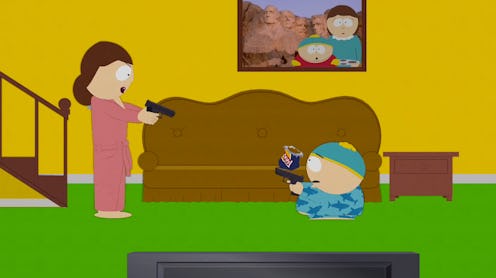News
'South Park's Gun Episode Says A Lot About America

Just a week after America witnessed its latest mass shooting unfold in San Bernardino, California, South Park ended its 19th season with a finale on gun control. As anyone familiar with the show would expect, the episode was unapologetically over-the-top, but as its done over the course of 18 years, the show tackled an important issue of the moment in its own twisted, exaggerated way. Unlike some other shows that rely on satire, what South Park avoids is taking a clear stance on either side of the issues it covers, but that doesn't mean it's not commenting on them. Though it pandered to neither liberals nor conservatives, South Park's gun episode does reflect America's gun culture and how out of control it's become.
Wednesday night's finale, which concluded a season centered on the notion that P.C. culture is destroying the country, touched on what is probably America's rawest nerve: the gun debate. Though the writers navigate through the episode without stepping inside partisan lines, every plot point underscores how extreme our gun culture is today.
When a new threat emerges in town, Kyle convinces Cartman, Stan, and Kenny to arm themselves with guns.
"There's no way to know who we can trust," Kyle says. "There's only one thing we can do: we have to get guns."
And with the blink of an eye, they are armed, which can be seen as a comment on how Americans are able to obtain guns with shocking ease.
Soon the entire town is armed, and guns come into play with any and every argument, no matter how petty. For example, when Cartman's mom demands that he goes to bed, he whips out a handgun and points it at her in protest, but then she aims one back at him and a standoff ensues until he gives in.
"Wow," Mrs. Cartman says in disbelief as she cradles her gun. "He listened."
The scenario — a mom and her fourth-grade son pointing guns at each other while saying, "I love you" — seems like an absurd juxtaposition, but it's actually a chilling caricature of real-life incidents, whether it was intentional or not. Just this fall alone, there have been multiple reports of mothers shooting their own sons, including one on Oct. 23, one on Oct. 28, and one on Nov. 9.
The pettiness of the argument between Cartman and his mom is another comment on how little it takes these days for people to draw guns on one another. Last October, a Florida man was sentenced to life in prison for shooting a teenager because he was playing his music too loudly.
Later, another standoff ensues between Randy, Stan, Sharon, and Shelly, but again, instead of ending in violence, it prompts them to be more open and honest with each other, leading to a healthy discussion. "Wow," Randy says in awe, "these things are amazing."
The episode ends with everyone at the Purina-sponsored South Park Gun Show, where gun-toting owners compete with one another in the same way owners would at a dog show. Another argument ensues and everyone at the show engages in a huge standoff. With everyone armed and dangerous, viewers were made to anticipate a brutally violent gun fight at the episode's conclusion, but instead, the townsfolk talk to each other and realize they all need to listen better.
This is creators Trey Parker and Matt Stone's blatant avoidance of conveying a liberal, anti-gun message, but it shouldn't be construed as a pro-guns message either. Just because nobody died by gun violence in the episode (not even Kenny) doesn't mean it can't be used to argue for gun control. The sheer fact that everyone in town is able to arm themselves by the end of the episode and a dog-show-like competition is being held for gun owners is a comment on how saturated American society and culture has become with guns and the argument over gun rights.
Furthermore, as much as conservatives would like to deny this, the whole "guns helping people have healthier conversations" theme is not, in my opinion, a pro-guns statement. To me, the writers were highlighting the absurdity of that notion (a character whispering "Wow" and hugging their pistol close to their bosom should not be taken as an earnest statement of any kind), because South Park is, after all, satire.
Image: South Park Studios/YouTube